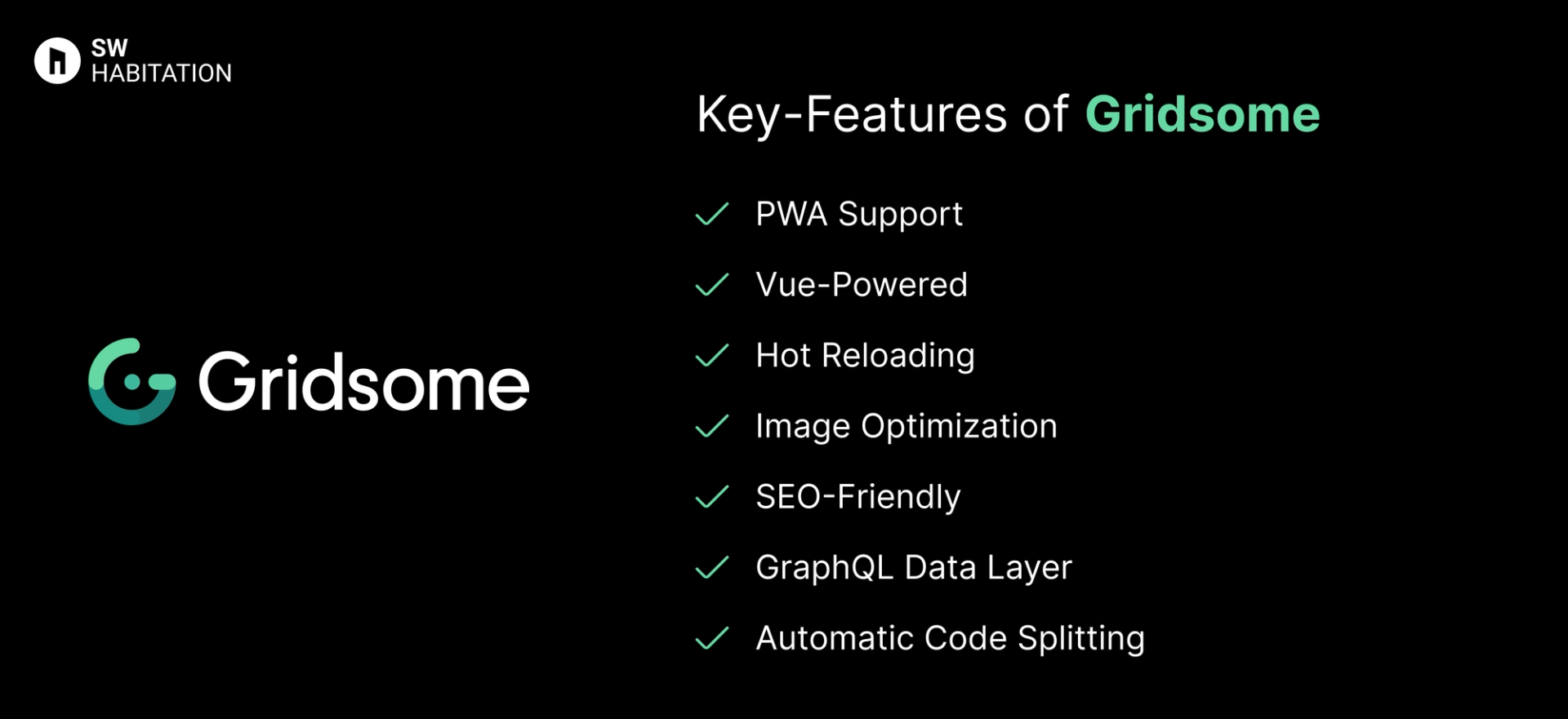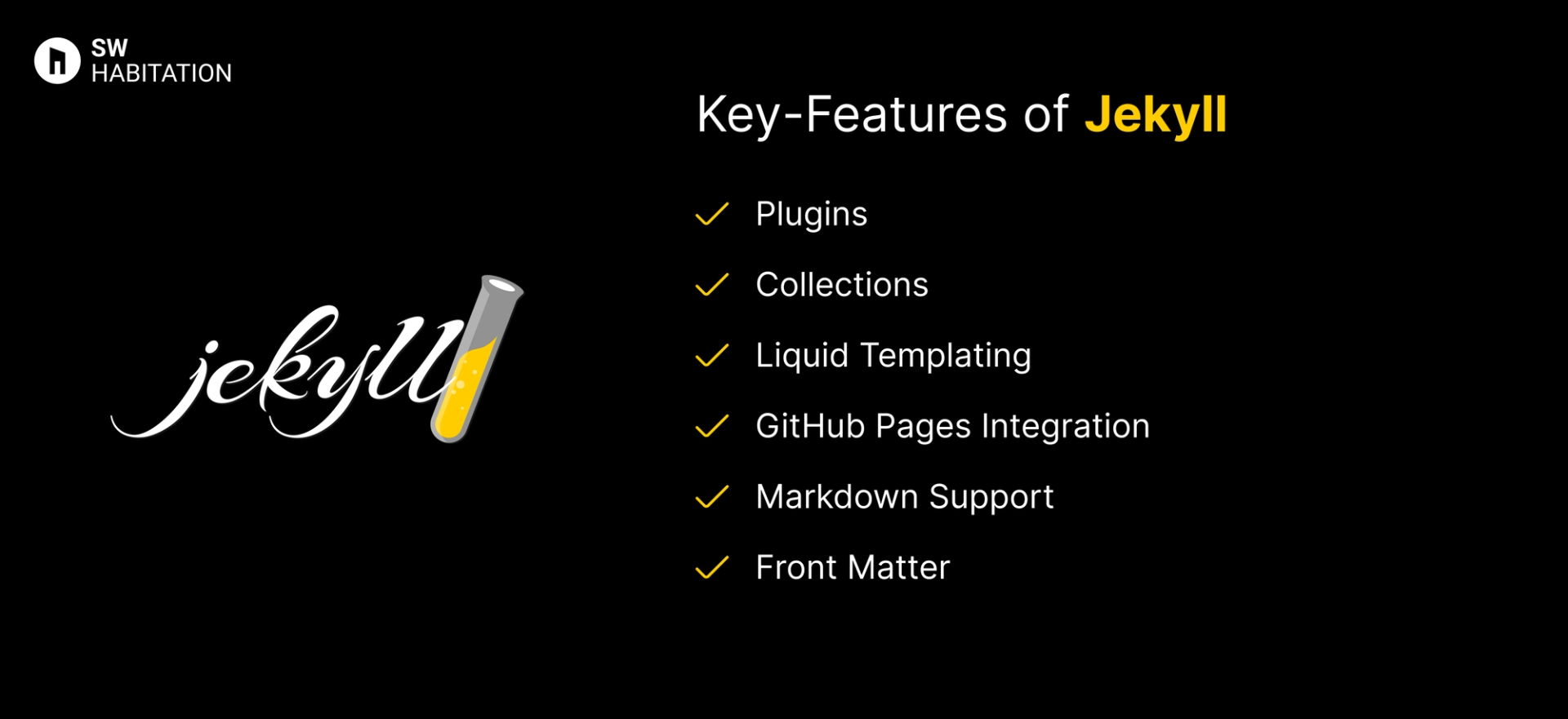Gridsome vs. Jekyll

Gridsome

Jekyll
Have you ever been to a website that loads super fast? Chances are it uses an SSG (Static Site Generator). It’s a tool that builds your site ahead of time, so when someone visits, they get the page instantly. No waiting around for things to load it’s just there.
What is Gridsome?
Gridsome is a Vue.js-based static site generator that pulls data from various sources — like APIs, Markdown, or CMSs — and builds blazing-fast static sites. It handles everything from data fetching to page generation, letting you focus on crafting beautiful UIs with Vue.
Key Features of Gridsome


- PWA Support: Turn your site into a Progressive Web App effortlessly.
- Vue-Powered: Leverages the simplicity and power of Vue.js.
- Hot Reloading: Instant updates during development.
- Image Optimization: Automatically optimizes images for faster loading.
- SEO-Friendly: Pre-renders pages and offers meta tag management.
- GraphQL Data Layer: Fetch data from any source and use GraphQL to query it.
- Automatic Code Splitting: Loads only what’s needed for each page.
Advantages of Gridsome
- Image Optimization: Automatically optimizes images for faster loading.
- SEO-Friendly: Pre-renders pages and offers meta tag management.
- Vue-Powered: Leverages the simplicity and power of Vue.js.
- Hot Reloading: Instant updates during development.
- GraphQL Data Layer: Fetch data from any source and use GraphQL to query it.
- PWA Support: Turn your site into a Progressive Web App effortlessly.
- Automatic Code Splitting: Loads only what’s needed for each page.
Disadvantages of Gridsome
- Less Community Support: Smaller community compared to Gatsby or Next.js.
- GraphQL Requirement: Requires some GraphQL knowledge.
- Vue-Only: Not ideal if you’re unfamiliar with Vue.js.
What is Jekyll?
Jekyll is an open-source static site generator built with Ruby. It takes your text files (written in Markdown), processes them through templates, and generates a static website that you can deploy anywhere.
No databases, no server-side scripting it just pure HTML, CSS, and JavaScript. It’s super popular among developers, especially for creating personal blogs and documentation sites.
Key Features of Jekyll


- Plugins: Extend functionality with a rich plugin ecosystem.
- Collections: Organize content beyond just posts and pages.
- Liquid Templating: Use Liquid, a simple templating language, to customize your site.
- GitHub Pages Integration: Seamless deployment on GitHub Pages.
- Markdown Support: Write content in Markdown, and Jekyll handles the rest.
- Front Matter: Easily add metadata like titles, tags, and layout options.
Advantages of Jekyll
- Highly Customizable: Tweak layouts, templates, and styles to make the site your own.
- Active Community: Tons of tutorials, plugins, and themes to explore.
- Simplicity: No database, no backend — just Markdown and templates.
- GitHub Pages Friendly: Direct integration with GitHub Pages means free hosting and automatic deployment.
- Perfect for Blogs: Designed with blogging in mind, making it easy to manage posts.
Disadvantages of Jekyll
- Build Times: For very large websites, build times can get a bit slow compared to newer tools.
- Limited Dynamic Content: Since it’s static, things like user authentication or live updates need extra work.
- Requires Ruby: You’ll need Ruby installed on your system, which can be a hurdle for some.
Comparison Between Gridsome vs Jekyll
Use Cases of Gridsome
- Vue Enthusiasts: If you already know Vue, Gridsome is a natural fit.
- Fast and SEO-Optimized Sites: Automatic pre-rendering makes SEO a breeze.
- API-Driven Projects: Works great with headless CMSs, APIs, and data-heavy projects.
- Content-Driven Sites: Blogs, portfolios, documentation sites.
Use Cases of Jekyll
- Portfolios: Showcase your work with a simple, fast, and customizable site.
- GitHub Projects: The perfect companion for project documentation hosted on GitHub.
- Documentation Sites: Clean, simple, and easy to organize docs.
- Personal Blogs: Its blogging-focused features make it a favorite for tech blogs.
Other Resources
Conclusion
Static Site Generators are a big game changer if you’re looking to build a website that’s fast, secure, and easy to maintain. Whether you’re launching a personal blog, portfolio, or a business website, they give you the freedom to focus on what really matters, your content and your users without all the extra complexity.
The best part? You’re not locked into one way of doing things. You can choose the tools and tech you’re most comfortable with, and scale things up as your site grows. From lightning-fast load times to better SEO and easy hosting, SSGs make the whole process smoother.
At the end of the day, it comes down to what fits your workflow and goals best. Pick the one that feels right to your requirements, and you’ll be well on your way to creating a beautiful, high-performing website that you’re proud of 🙌
Frequently asked questions
Is Gridsome based on Vue?
Yup, Gridsome is built on Vue.js, and it allows you to use Vue components within your static site.
Does Gridsome support GraphQL?
Yup, Gridsome uses GraphQL to query and manage content from multiple data sources like APIs, markdown files, and headless CMSs.
Does Gridsome have a free plan?
Yup, Gridsome is open-source, and you can use it for free with no restrictions on your site’s size or content.
Is Gridsome good for large sites?
Yup, Gridsome is highly scalable and designed to handle large amounts of content with excellent performance.
Is Jekyll easy to set up?
Yes, Jekyll is developer-friendly and has great documentation. However, it does require Ruby and some command-line usage to set up and deploy.
Can I host Jekyll on GitHub Pages?
Yes, Jekyll integrates seamlessly with GitHub Pages, allowing you to host your site for free directly from your GitHub repository.
Does Jekyll require a database?
No, Jekyll is file-based, meaning your content is stored as Markdown or HTML files. It compiles everything into static files, so there’s no need for a database.
What is Jekyll good for?
Jekyll is perfect for building blogs, documentation sites, portfolios, and personal websites. It’s highly optimized for Markdown and Liquid templating.
